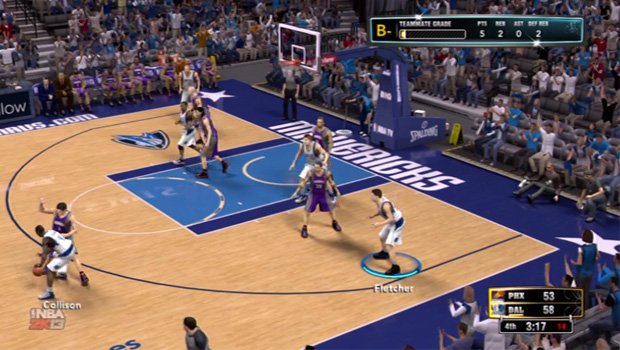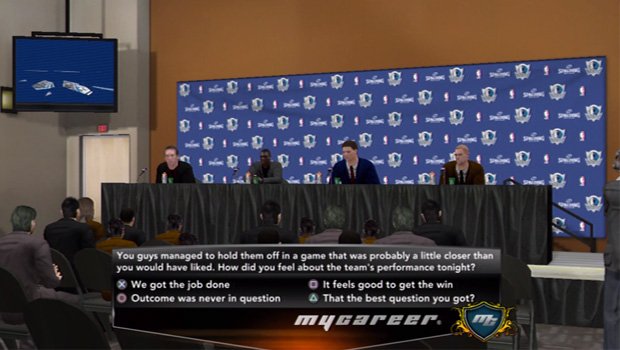NBA 2K13 career guide
Welcome to the NBA
Playing the Game

You’ve already seen how earning experience during a game works in the Rookie Showcase, and there’s little different once you make it to the NBA. During your first year, you’ll be lucky to see the court for more than ten minutes a game. As you improve, you’ll earn more playing time, but you’ve got to prove to the coach, team, and fans that you’ve got what it takes to be on the floor. In your rookie season, it’s very important to play solid, fundamental basketball. Don’t take risks. Don’t try to take over the game single-handedly. Make smart passes. Play smart defense. Shoot when you have the open shot.
Obviously earning rebounds, assists, and other key stats will lead to your earning more and more VC, but you’ll lose out on that experience just as easily by doing things poorly. The coach will constantly give you feedback during the game, and the constantly updating teammate rating will give you a good indicator of whether or not you’re playing the game the right way.
Occasionally, you’ll have instant challenges during a game called Dynamic Goals. They can be as simple as making your next two shots, or as difficult as scoring once, rebounding once, getting one assist, and blocking/stealing once before you are subbed out. Completing the Dynamic Goal will earn you some bonus VC at the end of the game, but missing it won’t cost you what you’ve earned otherwise. You can also earn double VC during what NBA 2K13 calls Key Games. During rivalry match-ups or potential playoff race games, you’ll have the chance to earn twice what you normally would have.

After the game, you’ll get to see how much VC you earned, then you’ll be whisked away to the post-game news conference. Here you’ll have another chance to improve your chemistry with the team, and earn more support from your fanbase. A reporter will ask you a single question based on the outcome of the just-completed game, and you’ll have four answers to reply with.
Each answer is measured carefully, and will result in different increases/decreases in chemistry and support. There’s never a reason to give the most negative answer, unless you’re looking to get traded. There’s no set button correlation to any of the possible responses, so you’ll just have to read each possible answer before responding. Improving your chemistry and fan support doesn’t hold any advantages during your first season, but as you progress these social networking options can help in contract negotiations.
After you’ve finished your first NBA game, how the rest of your career plays out is up to you. With this guide, you should have a solid foundation with which to build your Hall of Fame career. After a few seasons, you should be well on your way to earning some All-Star appearances, MVP votes, and All-NBA team nods. It’s all in your hands from here on out, but if you feel like shaking things up, you can always retire, and start a new career from scratch.
Table of Contents
Sign up to the GamesRadar+ Newsletter
Weekly digests, tales from the communities you love, and more


